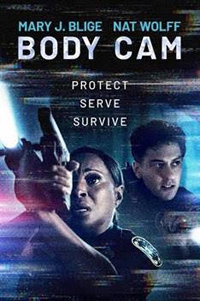Ghost Protocol: Vitthal Gets Supernatural with Hot Topic Horror
 Genre has always been a formidable platform to explore significant social ills in creative ways, often sidestepping the heavy-handedness of tragedy or melodrama. Such is the aim of director Malik Vitthal’s sophomore film, Body Cam a horror thriller headlined by the Queen of Hip Hop Soul, Mary J. Blige. Six years after his 2014 debut Imperial Dreams, Vitthal teams with scribes Richmond Riedel and Nicholas McCarthy, the latter a director of a number of similar supernatural indie films (The Pact; At the Devil’s Door) for a jam-packed portrait of retribution which plays with so many tangents and elements the film often feels as if it bit off more than it could chew. Still, Vitthal has concocted a definite curio piece considering its cast and valiant attempt to thread topical issues into innovative cultural conversation.
Genre has always been a formidable platform to explore significant social ills in creative ways, often sidestepping the heavy-handedness of tragedy or melodrama. Such is the aim of director Malik Vitthal’s sophomore film, Body Cam a horror thriller headlined by the Queen of Hip Hop Soul, Mary J. Blige. Six years after his 2014 debut Imperial Dreams, Vitthal teams with scribes Richmond Riedel and Nicholas McCarthy, the latter a director of a number of similar supernatural indie films (The Pact; At the Devil’s Door) for a jam-packed portrait of retribution which plays with so many tangents and elements the film often feels as if it bit off more than it could chew. Still, Vitthal has concocted a definite curio piece considering its cast and valiant attempt to thread topical issues into innovative cultural conversation.
When Officer Ganning (Ian Casselberry) is murdered during a routine traffic stop under mysterious circumstances, his colleague Renee (Blige) finds she is the only one able to see the footage of what transpired. Having just been restored to her post after serving an eight month suspension for assaulting a civilian and also dealing with grief after having recently lost a child, Renee is quickly able to ascertain whoever or whatever killed Ganning is related to a current scandal faced by her Louisiana police department regarding the recent suspicious death of a minor.
Much of Body Cam’s marriage of ghostly vengeance with technological attributes allows it similarities with the once-vibrant J-horror craze of the early 2000s. And it arguably finds a catharsis eluding many a recent melodrama struggling to convey the intersectionalities of police brutality with gender and race dynamics in such titles as Monsters and Men (2018) and Black and Blue (2019). However, in some regards, less would likely have felt like more.
McCarthy and Riedel’s screenplay slathers on the trauma with Blige’s Renee, a woman who is never quite given proper acknowledgement for her resilience. Plagued by the death of a child while overcoming sanction for assaulting a civilian who racially disparaged her, she’s thrown into a series of overwhelming situations as she stalks the culprit who killed her partner only to realize she’s not only up against something otherworldly, but has also stumbled onto high-ranking corruption concerning the death of a black, deaf child who was murdered by her colleagues.
Blige rises to the occasion, but this is hardly a character portrait which allows her the range of her Oscar nominated turn in Mudbound (2017) or an underrated portrayal as Dr. Betty Shabazz, wife of Malcolm X, in the television film Betty and Coretta (2013). Still, if there’s anything standing above the mire of warring narrative elements, it’s Blige’s grounding of the material, which takes on more sobering proportions in the final act (involving parallels with Annika Noni Rose’s character, whose presence in the cast list will give some audience members a leg up on predicting what’s going on).
Although Nat Wolff often seems too young, even to play a wet-behind-the-ears rookie as Renee’s newly assigned partner, his character’s inconsistency eventually reveals itself as plausible, but it’s one of many facets where Body Cam’s narrative trajectory seems to distract more than the eventual pay off of the film’s revelations. One wonders how the film could have been restructured if Blige’s Renee had been an actual police detective and therefore an outside perspective of the impervious thin blue line syndrome, especially since Body Cam never really reconciles the invisible hierarchies and dread of difference within the trenches of law enforcement.
★★½/☆☆☆☆☆


